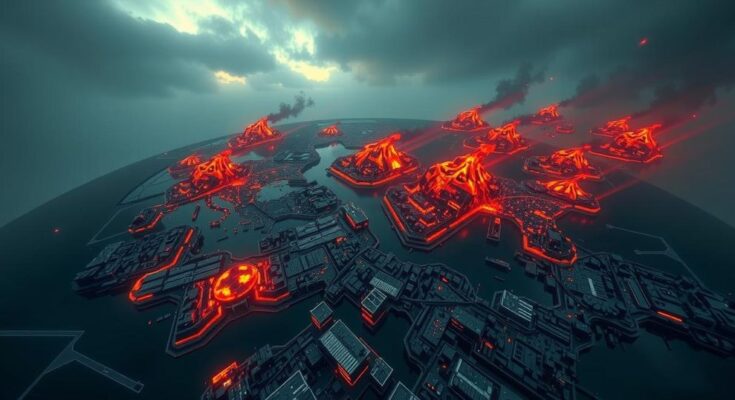The article explores the dual nature of Armageddon as both a war and a representation of the global crisis of climate change. It highlights the urgency of addressing environmental issues, as recent research reveals alarming trends in global warming and their socioeconomic impacts. By invoking religious teachings on stewardship, the need for collaborative action against climate change is emphasized, aiming towards a hopeful and sustainable future for humanity.
The term Armageddon, often associated with conflicts and apocalyptic imagery, does not explicitly appear in the Hebrew Bible but is referenced in the Greek New Testament as the assembly place for kings destined for a great battle. Notably, recent interpretations highlight that this battle can be understood as humanity’s ongoing struggle against global warming, aligning with teachings in both Judaism and Islam urging followers to act as stewards of the Earth.
The urgency of planetary care is underscored by alarming scientific reports projecting significant risks from climate change, with the effects disproportionately impacting those who contribute least to greenhouse gas emissions. Researchers reveal that a mere increase of half a degree Celsius could lead to devastating consequences for ice sheets and sea level rise, endangering millions and exacerbating social inequalities.
Globally, warming trends have intensified, with Europe experiencing temperature increases at twice the rate of other regions since the 1980s. Compounded by record carbon emissions post-pandemic, many communities are now facing severe environmental and socio-economic challenges, with projections that by 2100, nearly 90% of marine life could face extinction if current emissions patterns continue.
The discourse on climate change intersects with political realities, as democratic freedoms are increasingly threatened worldwide; the Varieties of Democracy Institute indicates that in 2022, authoritarian regimes outnumbered liberal democracies, leading to a decline in civil liberties. Within this context, the upcoming generation may hold the key to catalyzing necessary changes, blending faith traditions with a renewed commitment to responsible stewardship and collective action.
Prophetic traditions from Judaism, Christianity, and Islam offer a framework for understanding societal upheavals as potential signals of transformation, with predictions of a Messianic Age following a period of turmoil. Recognizing the interconnectedness of humanity, religious figures and communities are encouraged to emphasize collaboration and mutual respect to bring about a peaceful future.
This article ultimately frames the current existential crises, such as climate change, not merely as apocalyptic fears but as integral elements of a divine narrative that calls for human agency and responsibility. The interplay of faith, prophecy, and actionable ethics may guide humanity toward a future characterized by justice, peace, and sustainability, echoing the prophetic vision of nations living in harmony.
The notion of Armageddon encompasses not solely warfare but also the pressing issue of climate change, a threat that portends global consequences for humanity. In the context of religious teachings, both Judaism and Islam advocate for the guardianship of the Earth, echoing the moral responsibility of humans as caretakers of the environment. Understanding the environmental repercussions of human actions, particularly regarding greenhouse gas emissions, is vital for assessing the trajectory of our planet’s future. Numerous studies have demonstrated the acute risks of climate change, underscoring the need for urgent action to mitigate these effects and foster resilience in vulnerable communities.
In conclusion, the narrative surrounding Armageddon is intricately linked to global warming and humanity’s moral imperative to protect the Earth. As climate threats escalate, there is a compelling call to action within religious traditions to foster stewardship and social equity. The coexistence of prophetic visions and contemporary ecological challenges presents an opportunity for collective mobilization towards achieving peace, justice, and sustainability, ensuring a more secure future for all.
Original Source: www.eurasiareview.com




